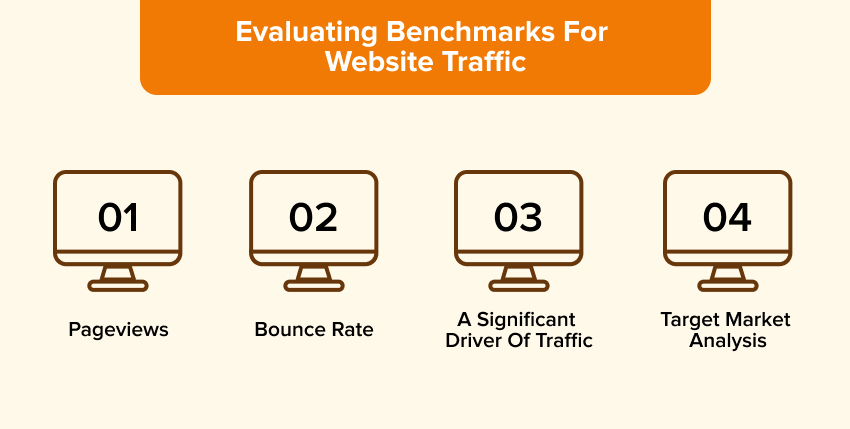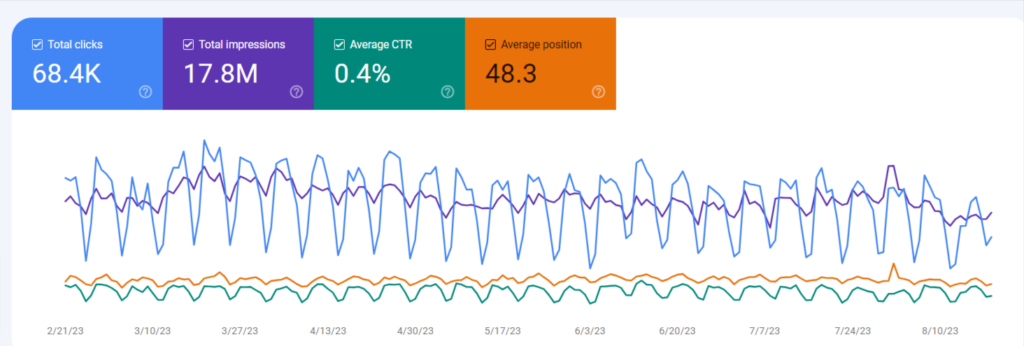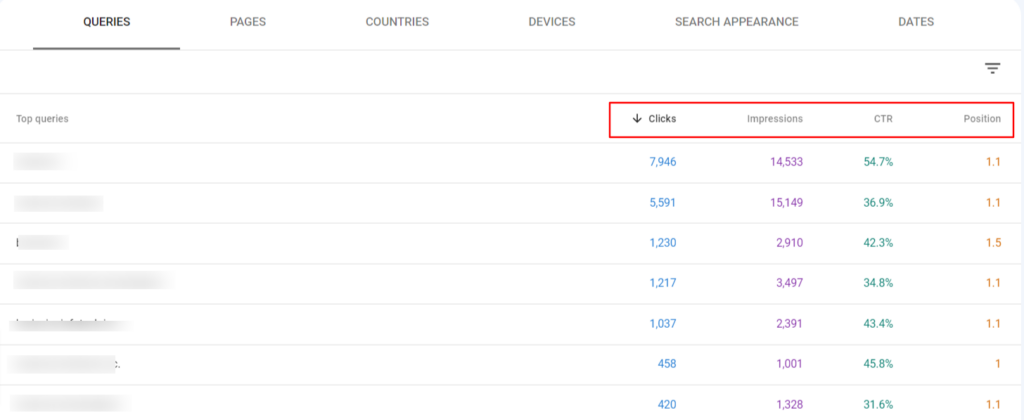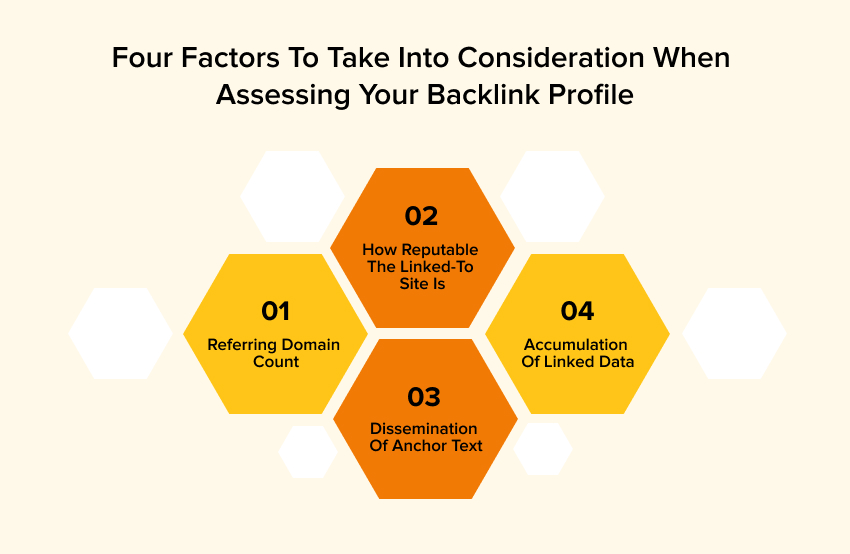The problem with SEO isn’t lack of information. In fact, it’s quite the opposite. In most cases, you have too much data. The goal is to decide which KPIs best serve your needs and those of your business or clientele. And it’s not always easy to do that.

This article talks at length about the metrics that matter most. Additionally, you’ll discover how to measure each one.
Let’s get started, then!
What Does SEO Benchmark Mean?
Key performance indicators (KPIs) and benchmarks are often used interchangeably, which might be confusing if you’re new to search engine optimization (SEO). Both serve the purpose of sharing resources, but are also different from each other.
KPIs are industry statistics used to measure performance over time and get insight into the efficacy of an SEO strategy.
As opposed to this, benchmarks are the key performance indicators that you use as a standard against which the success of your SEO campaign can be measured.
One such metric is organic traffic. However, the organic traffic from the previous month might serve as a benchmark.
Identifying Key SEO Benchmarks
Once every few years, First Page Sage releases SEO industry benchmarks based on data from its database. Our most recent results are summarized in the table below. You don’t have to monitor each one of those KPIs as an SEO company. Only keep tabs on those that have a direct bearing on the success of your campaign.
While a big organization may use SEO to position its website as a trusted industry news source, a tiny e-commerce business may invest in SEO to increase sales. The former group would be more concerned with revenue benchmarks, while the latter may care more about organic traffic, keyword ranks, and backlinks.
The objective is to monitor the indicators of corporate development.
And to determine critical SEO benchmarks according to your company’s requirements, consider the following:
1. What is it that you plan to advertise?
You may work on increasing general site traffic, or you can target a single product page.
2. What key phrases do you like to see your site score well for?
Do you need to rank for terms with low search traffic but significant commercial intent? Is it more crucial to rank for obscure keywords in your sector or for the most popular ones?
3. Who are some of your main rivals?
Examine the top sites for your target keywords to see where you stand in comparison.
4. Where does your site now stand in terms of search engine rankings?
Is Google not indexing your website? Google may have previously punished or not indexed the site. In order to make adjustments and establish realistic goals for expansion, you’ll need this information early on in your campaign.
5. How much money do you have to spend?
What percentage of your company’s budget can you set aside for search engine optimization? You should discuss your budget with your team in advance since specific benchmarks (such as a 100% YOY increase in traffic) would demand a more significant expenditure than others.
Now that you know the answers to those questions, we can discuss the metrics you should monitor.
Measuring Website Traffic Benchmarks
The amount of people who visit a website is measured by its traffic. Google Analytics and Adobe Analytics are standard website monitoring tools that use a JavaScript snippet to collect traffic.

Search engine, direct, referral, email, and pay-per-click (PPC) traffic may all be monitored, as can a variety of other metrics such as:
- Pageviews
- Bounce rate
- A significant driver of traffic
- Target market analysis
More often than not, the primary goal of search engine optimization is to increase organic traffic. As we’ve seen, rankings are crucial; a higher position means more visitors. (CTR is also important, but we’ll get to that in a minute.)
To evaluate the efficacy of each page, you must monitor its share of organic traffic. Learn which pages are succeeding and which are failing and why.
You may evaluate how you measure up by comparing your traffic with the market and your top rivals.
How can you measure the effectiveness of SEO efforts?

Google Analytics provides you with an overall site traffic measurement. You’ll need to do some exploring to uncover information that is unique to each page.

While GSC may be used as a starting point for analyzing organic clicks, we recommend delving deeper into it. The context and value of positive initiatives are better understood by benchmarking against the competitors. It’s another essential SEO indicator to keep an eye on every day.
Evaluating Keyword Ranking Benchmarks
In search engine optimization (SEO), the objective is to move up as high as possible on the search engine results page (SERP) for a given term. The position on the SERP determines keyword ranking.

Additionally, there are two distinct measures for keyword rankings:
- Number of keywords for which each page is optimized
- Positions in the search results for specific keywords
A high page rank for several keywords increases the likelihood that you will return your content in relevant search results. More than a quarter of all clicks (on Google, at least) go to the top mark, so being anywhere near it is excellent. The majority of users (about 75%) will only ever look at the first page of search engine results.
Although we focus on one or two keywords per page, a high-quality website will score well for many other closely-related terms.
You can discover which sites require more work by monitoring their keyword rankings. For instance, if a page has fallen from the top rank for a high-volume term, you’ll want to investigate why this has happened and what may be done to restore it to its former glory.
Checking Your Keyword’s Position

Numerous search engine optimization (SEO) solutions are available. We can use SEMRush and Ahrefs. Both systems show you how well or poorly your site performs for every term, or you may narrow your focus to monitor only those keywords.
Analyzing Conversion Rate Benchmarks
The conversion rate is the proportion of natural traffic that completed the desired action. It refers to whatever the user does on the website, varying from company to company. Examples include joining up for something, buying something, or filling out a form.
The organic conversion rate is often used as a proxy for the success of an online marketing campaign by many marketers.
If your website’s conversion rate is poor, it means that either your content or product page isn’t persuasive enough or your audience targeting requires improvement.
If you want to know how well your keywords and the searcher’s intent align with your selling, go no further than the conversion rate.
How can the conversion rate be measured?
One of the most important marketing indicators is the conversion rate. It’s a standard by which all marketers in the lead generation industry, from entry-level staff to CEOs, are evaluated.
Here is the formula for calculating the conversion rate that can be used in practice.
Conversion Rate = Total number of conversions / Total number of unique visitors * 100
For Google Analytics to accurately measure and monitor conversions, you must enable event tracking and specify objectives. Check-in on it once a week or once a month, depending on the volume of business and the significance of the page. Online retailers may check much more regularly than this, although they may need to use GA.
Websites that generate a lot of income frequently develop unique dashboards to keep tabs on key indicators in the most efficient manner possible.
Benchmarking Backlink and Domain Authority
Prepare to experience the results of your site’s backlink profile and discover its hidden potential for soaring internet visibility. You may broadly assess the success of your SEO effort by analyzing the backlinks it garners from other websites. It is also crucial to monitor your site’s internal connections.

When assessing your backlink profile, keep in mind these four factors:
Referring domain count: The diversity of your site’s inbound links may be gauged using this measure. Having a wide variety of referring domains is beneficial since it demonstrates that several websites appreciate your offer.
How Reputable the Linked-to Site is: It’s not true that all links are equal. The total domain authority may be considerably affected by the quality of the websites that connect to you.
Dissemination of Anchor Text: Anchor text is the text inside a hyperlink that may be clicked on to be taken to another website. A well-rounded distribution of anchor texts tells search engines which subjects and keywords are most relevant to your site.
Accumulation of Linked Data: Monitoring the rate and consistency of fresh backlink acquisition is essential for long-term SEO success.
By analyzing these indicators, you may spot problems and adjust your approach.
Successful SEO strategies also need an awareness of click-through rates (CTRs). CTR optimization is a proven method for increasing organic traffic and SERPs’ leads. Let’s dig into the inner workings of CTRs and why they’re so crucial to SEO success.
Domain Authority Ratings.
When comparing websites, all the leading keyword research tools employ their unique domain authority ratings.
- Domain Authority (DA) is what we term it at Ahrefs.
- In SEMRush parlance, this is the “Authority Score” (AR).
- Moz refers to it as DA or Domain Authority.
Use them interchangeably to gauge how your site compares to the competition. If a rival scores much better than you, you may need more time to compete with them for the exact keywords.
It’s worth noting that Google doesn’t create domain authority ratings but is only a third-party tool for making rapid comparisons across sites.
Evaluating Mobile Optimization Benchmarks

The introduction of mobile-friendliness as a ranking criterion came to the media limelight in 2015. Because mobile traffic is typically more prominent in volume than desktop traffic, this plays a key role in developing browser behavior.
One of the many helpful reports in Google Search Console details a site’s mobile friendliness and flags any problems that may arise. It’s important to note that the quality of your mobile site is more important than the likelihood of conversion in this measure.
Therefore, use Google Search Console to monitor your sites’ Mobile Usability. GSC will report the percentage of your site that is mobile-friendly. It would help if you rectified any problematic mobile areas immediately.
How to Keep Tabs on Mobile Activity?
You can find the Mobile Usability tab on the left side of the main page in Google Search Console. When you click that link, a new window will pop up, showing you a breakdown of how well each page of your site performs on mobile devices.
The Impact of SEO Benchmarks on Business Success
As stated in the introduction, data fuels decision-making. There will always be figures that stand out in the corporate world. Multiple data points are needed to have a whole picture of SEO, and you must consider both the pros and cons at each stage.
Although traffic, rankings, and conversions get the maximum attention, the stats that propel a company are discussed openly.
Knowing how data drives a company’s growth and how achievements and opportunities are communicated and interpreted is an ongoing learning process for every digital marketer.

FAQs
SEO benchmarks are necessary to measure a website’s performance compared to industry norms. They provide helpful information about your site’s performance and potential trouble spots when appropriately utilized. You can establish the strategic objectives using key performance indicators (KPIs) and benchmarks.
You can track Key performance indicators (KPIs) such as organic search traffic, keyword ranks, and backlinks to gauge a site’s SEO success. Also, ensure the success of your SEO efforts by tracking these indicators over time and looking for a rising trend.
The answer to this question is dependent on the specifics of your company. Setting benchmarks aims to evaluate your progress over that of others. Processes, products, and operations may be measured against internal and external benchmarks, including those of other departments, external firms (such as rivals), and industry best practices.
Business objectives and industry may have a significant impact on SEO benchmarks. Conversion rates may be more critical for e-commerce sites, whereas an organic increase in visitors may be more influential on content-driven platforms. Keyword rankings tend to be more critical in industries with plenty of competition, such as banking, whereas local firms emphasize their presence on Google Maps.
Measure your SEO performance in a variety of ways, including the percentage of organic traffic that comes from search engines, the number of keywords that appear in the top 10 search engine results, the number of new subscribers, the number of backlinks, the average time users spend on your site, the percentage of goals that have been achieved, and so on.







